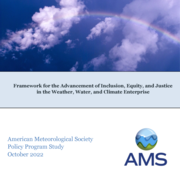Executive Summary:
Ethics and justice are central to advancing humanity and the human experience. An ethical and just world is the best possible world. Active effort encompassing all aspects of society, including the sciences, is almost certainly needed in order to achieve such a world. Moreover, the rate and breadth of scientific advancement and the societal benefits that result from science also depend on the promotion of inclusion, equity, and justice (IEJ). The weather, water, and climate (WWC) enterprise has the opportunity to become a leading example: ensuring that everyone everywhere is able to participate in and benefit from the science and services of the enterprise is key to ensuring that these sciences and services are impactful, meaningful, and ethical. Therefore, if we hope to advance science and the benefits of science to humanity as effectively as possible, the enterprise must be inclusive, equitable, and just.
Efforts must be comprehensive, intensive, informed, and sustained over time in order to effectively increase participation and success of groups underrepresented in and communities underserved by the WWC enterprise. Solutions will almost certainly depend on broadly distributed efforts championed by individuals, groups, organizations, and entire sectors that adapt as necessary to meet evolving needs. Therefore, making science truly inclusive and beneficial to all people will be an enterprise-wide endeavor. An enterprise-wide cultural change will be needed to confront systems of oppression and enable contributions from all people and organizations of the enterprise.
The framework developed here aims to 1) affirm the need for urgent cultural change toward a more inclusive, equitable, and just community; 2) honor, welcome, and serve all; 3) recognize and dismantle racist and inequitable systems and structures that have excluded, marginalized, or ignored people and communities; 4) promote a shared vision of success in IEJ for the WWC enterprise; 5) promote the inclusion of people from all groups within the enterprise and the equitable sharing of the benefits from science among all people; 6) inspire and enable all members of the enterprise to actively advance IEJ; 7) provide guidance, support, and resources to enable efforts across all levels of organization to advance IEJ; and 8) demonstrate a commitment to progress over the long term.
Inclusion is the active and deliberate pursuit of creating a society where all are welcome, respected, and able to participate and contribute. Inclusion means all participants feel they can bring their full and authentic selves to their work without pressure to assimilate to any dominant culture. The building of inclusion will effectively support diverse backgrounds and identities across all levels and scales of the enterprise.
Equity is the fair opportunity for all people to fully benefit from and contribute to the insights, applications, and services of the enterprise.
Justice is the fair treatment of all, including with respect to opportunity, accountability, and restitution. This includes, to the extent possible, making amends for past wrongs and repairing relationships with those who have been negatively impacted by past actions.
As is evident in these definitions, there is some overlap between inclusion, equity, and justice. All demand the dismantling of barriers to opportunities, resources, and services within the enterprise and confronting the underlying systemic contexts that create and perpetuate such barriers.
Developing a shared definition of success with respect to IEJ is critical. This framework presents a broad vision of success in IEJ that includes enabling 1) a welcoming environment, 2) culture change, and 3) WWC science and services that benefit all people. This vision, along with specific outcomes, can be used to guide and inspire comprehensive efforts to promote IEJ.
Success in promoting IEJ depends on taking actionable steps. Which actionable steps are appropriate and most effective is likely to vary among specific individuals, groups, teams, cohorts, organizations, sectors, or enterprises. Several overarching principles, such as promoting anti-racism and rooting efforts in allyship and service to others, guide these actionable steps, although best practices and specific needs will also almost certainly evolve over time. This framework identifies a variety of actionable steps and outcomes, including the following:
- Committing to enthusiastic and continuous advancement of IEJ including through personal education, adoption of best practices, and active effort.
- Critically examining existing structures of power and privilege.
- Determining what practices for advancing IEJ are appropriate within specific contexts.
- Creating space for training in and discussion of IEJ-related topics.
- Achieving equity and accessibility in design of online and physical spaces and gatherings.
- Engaging meaningfully with communities, including through participation in community-based science efforts.
- Establishing open and frequent communication regarding IEJ.
- Creating IEJ-focused career development and support.
Metrics of IEJ are valuable tools to establish baselines, encourage efforts, evaluate progress, assess and refine specific actions, and enable accountability. There can, however, be challenges or even antagonism in connecting what can be measured (i.e., a readily available metric) and a desirable outcome (e.g., an enterprise where all people can contribute their knowledge, skills, abilities, and energy to their full potential). Consequently, careful attention must be given during the development of metrics for IEJ in order to ensure they align most effectively with desired outcomes.
The American Meteorological Society (AMS) is committed to IEJ and the cultural change that is needed to achieve IEJ. This framework concludes with a look at AMS’s ongoing and future efforts to advance IEJ as an illustration of the implementation of the outlined principles and approaches. Most notably, AMS will conduct a comprehensive Equity Assessment of the organization and its activities to understand our successes, failures, shortcomings, and opportunities. We will use the insights that result to develop a Strategic Plan that provides the goals, actionable steps, benchmarks, and metrics needed as we move through the process of cultural change.
Suggested Citation: Tipton, E., L. White, and P. Higgins 2022: Framework for the Advancement of Inclusion, Equity, and Justice in the Weather, Water, and Climate Enterprise. An AMS Policy Program Study. The American Meteorological Society, Washington, D.C. https://doi.org/10.1175/framework-for-equity-inclusion-justice-2022
